Past Event
Oct
AusACPDM Listening and Sharing session: 26th October 2022
Oral Health for Children with CP or similar conditions
26th October 4:30pm Australian East coast Daylight Savings Time
Join us in our free listening and sharing session.
Topic information: This topic will cover the importance of oral health care in patients with cerebral palsy and physical disabilities. The topic will discuss dental disease and highlight the importance of an oral health care preventive approach and practical tips to assist. This topic will be of benefit to all health care professionals, parents and carers.
Speaker: Stephen Moor; Oral Health Therapist
The session will be facilitated by: Janet Danielson, Speech Pathologist
Date: 26 October - 26 October
Location: Zoom, please register for the link
Register now More detailsNov
Prechtl’s General Movements Assessment: Basic & Advanced Courses in New Zealand
Prechtl’s Method has shown its merits for the prenatal and postnatal evaluation of the integrity of the nervous system. Prechtl’s General Movements (GMs) predict how the young central nervous system is developing. They can identify neurological issues predictive of cerebral palsy and other developmental disabilities. Basic and Advanced courses will be hosted at the Liggins Institute, University of Auckland.
These 3.5 day courses fulfils the standards specified by the GM-Trust.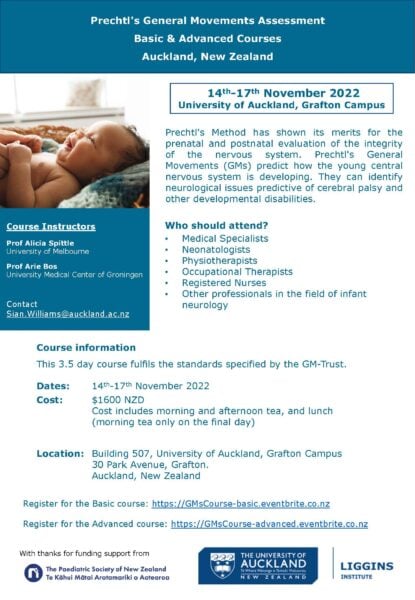
Who should attend?
- Medical Specialists
- Neonatologists
- Physiotherapists
- Occupational Therapists
- Registered Nurses
- Other professionals in the field of infant neurology
Note: The advanced course is only available to those who have completed the basic training.
Download and share the Flyer
Date: 14 November - 17 November
Location: Building 507, University of Auckland, Grafton Campus, Auckland, New Zealand
Register now More detailsAug
COMMUNITY OF PRACTICE for Advocates of Developmental Disabilities Services
What?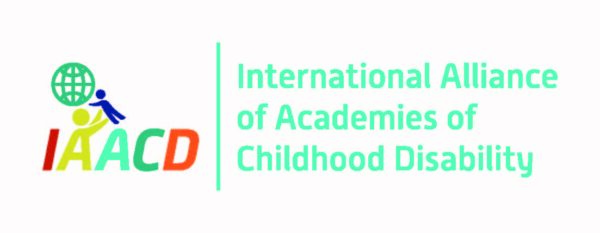
The Community of Practice (CoP) is a space created for people to share their experiences about the implementation of services for children with developmental disabilities with others – a mutual learning and self-help group, with the perspectives of seasoned clinicians, managers and others who have had these kinds of challenges and have ideas and experiences to share.
When?
Two groups are being set up and you are welcome to join which ever group fits best with your life and time zone
- Launching date: Tuesday 23rd August or Monday 22nd depending on your time zone)
- Sessions will then be held bimonthly (August, October, December) on the last Tuesday of the month
- Time: GMT/UTC Monday 22nd August 23:00
Date: 22 August - 22 August
Location: Zoom, please register for the link
Register now More detailsAug
AusACPDM Listening and Sharing session: 31st August 2022
First Nations cultural adaptation of the LEAP-CP early Screening Program
31st August 4:30pm Australian EST
Join us in our free listening and sharing session.

Topic information: Early screening programs can identify infants who are ‘on track’ with their development and those who require extra support to grow strong. The LEAP-CP early screening study is a culturally adapted program embedded in hospital services in North QLD and aims to offer First Nations babies and families early movement and learning checks over the first year of life to support infant development. The cultural adaptation and modification of the screening program utilises a participatory action research model involving community consultation and engagement, targeting key components of cultural safety and sensitivity, consultation and co-design, capacity building and sustainability. This session may be of interest to clinicians and researches working with Aboriginal and Torres Strait Islander infants and families.
Speakers: Leanne Mick-Ramsamy, Carly Luke
The session will be facilitated by: Professor Ros Boyd
Date: 31 August - 31 August
Location: Zoom, please register for the link
Register now More detailsJul
AusACPDM Listening and Sharing session: 27th July 2022
Implementing and evaluating PROMs and PREMs in practice: challenges, opportunities and future directions
27th June 4:00pm Australian EST
Join us in our free listening and sharing session.

Topic information: This presentation will give an overview of evidence regarding effectiveness and implementation of PROMs and PREMs in routine practice. The ways in which feedback of information from PROMs and PREMs to clinical teams might work to improve care will be discussed. Also covered will be: how to choose an appropriate PROM, strategies to assist in using PROMs and PREMs in practice, how to evaluate the use of PROMs and PREMs in practice, and alternative methods of engaging patients and families to monitor outcomes.
This presentation will be of interest to those already using PROMs and PREMs in practice or planning to do this. It will also be of interest to researchers wishing to evaluate the effectiveness or implementation of these measures in practice.
The presentation will be relevant to all health professionals regardless of discipline and will focus on paediatric health care.
Speakers: Dr Zephanie Tyack (Senior Research Fellow in Implementation Science, AusHSI, QUT)
The session will be facilitated by: Associate Professor Leanne Sakzewski
Date: 27 July - 27 July
Location: Zoom, Register for link
Register now More detailsJun
AusACPDM Listening and Sharing session: 29th June 2022
Meet the Editor of Developmental Medicine & Child Neurology
29th June 4:30pm Australian EST
Join us in our free listening and sharing session.

Topic information: Following the successful “Ask me anything” session with Professor Bernard Dan at our AusACPDM/IAACD Conference, we have invited him back for another session where participants can ask anything about publishing. We will discuss how to get your work published, how to be a good peer-reviewer and many more hot topics in publishing.
Speakers: Professor Bernard Dan
The session will be facilitated by: Professor Alicia Spittle
Date: 29 June - 29 June
Location: Zoom, Register for link
Register now More detailsMay
Respiratory Illness in Cerebral Palsy: It’s everybody’s business
Join us in our free listening and sharing session.
Wednesday 25th May, 2022 4.30pm Australian EST

Topic information: Respiratory illness remains the biggest contributor to deaths in young people with CP. We will present the development of the consensus statement for the assessment, prevention and treatment of respiratory illness in children with CP. This talk will highlight the risk factors for respiratory illness and everybody’s roles in achieving best lung health for children with CP.
Speakers: Dr Noula Gibson, PhD, Research Coordinator Physiotherapist, Perth Children’s Hospital
The session will be facilitated by: Dr Rachael Marpole, Advanced Respiratory Trainee, Perth Children’s Hospital and PI for the REducing ReSPiratory Admission in CP- A Feasibility Controlled Trial (RESP-ACT)
Date: 25 May - 25 May
Location: Zoom, please register for link
Register now More detailsJul
12th AusACPDM Biennial Conference: Respect Respond Reimagine
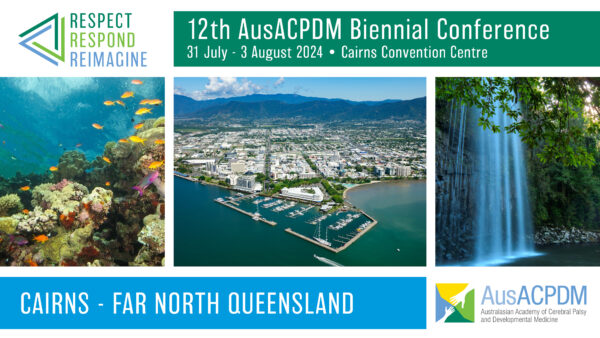 On behalf of the Australasian Academy of Cerebral Palsy and Developmental Medicine (AusACPDM) we invite and welcome you to the 12th AusACPDM biennial conference hosted from Cairns, traditional lands of the Gimuy Wluburra Yidinji and Yirrganydji people, Australia July 30-August 4, 2024.
On behalf of the Australasian Academy of Cerebral Palsy and Developmental Medicine (AusACPDM) we invite and welcome you to the 12th AusACPDM biennial conference hosted from Cairns, traditional lands of the Gimuy Wluburra Yidinji and Yirrganydji people, Australia July 30-August 4, 2024.
The conference theme Respect, Respond, Re-imagine embodies the values and visions of our Academy. Treating people with developmental disabilities and their families, First Nation’s people, each other and the environment with respect, ensuring that we respond to families’ needs, requests and priorities, and re-imagining a world where people with a neurological condition don’t actually have a disability because our world is fully accessible and ableism does not exist.
Our scientific program is starting to be developed in partnership with professionals across many disciplines and families and people with developmental disability. The program will offer a broad range of cutting-edge international research, best practice interventions, knowledge translation and inclusion, from both high and low resource settings.
We invite you to connect, communicate and collaborate, before, during and after the conference. COVID-19 continues to impact people but one of the few positives was the move to more accessible “virtual” education offerings. For this reason, the conference will be fully hybrid. You will be able to attend in person or virtually – whatever is most beneficial for you.
We are aiming to run our first carbon neutral conference. If you choose to join us in person we invite you to help us do this by reducing avoidable greenhouse gas emissions and waste, plus compensating through carbon offsetting. For some, attending virtually is also seen as more sustainable for the environment, another reason for the hybrid format. We will help you take on this mission – stay tuned for updates on the website. This is a very special part of the world, and we must leave no footprints at the end of the conference.
You will see changes on the website as we develop the program and we will continue to update you via e-zines and web notices. Please put the Conference website on your ‘quick-links’ and sign up for our e-zines to keep informed.
We look forward to working, learning and collaborating with you,
Sarah McIntyre, Alicia Spittle & Kirsty Stewart.
on behalf of the “Respect, Respond, Re-imagine” Organising committee
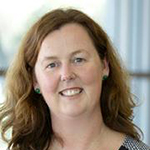
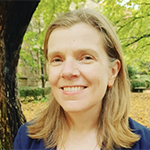
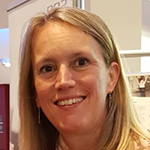
Date: 31 July - 3 August
Location: Cairns, Far North Queensland
Register now More detailsApr
AusACPDM Listening and Sharing session: 27th April 2022
Dispatches From An Information Dessert: Framing CP As Adults
27th April 4:30pm Australian EST
Join us in our free listening and sharing session.

Topic information: Cerebral Palsy is a complex condition to live with, made more so by the fact that it encompasses such a broad spectrum of experiences & realities. Adults living with CP become responsible (by default) for articulating and advocating for themselves within systems not built for continual experience of childhood-onset disabilities. Hannah and Amy bring together both their personal experiences and professional interests to discuss the key elements of this topic.
Speakers: Amy Hogan and Hannah Diviney
The session will be facilitated by: Petra Karlsson and Sarah McIntyre
Date: 27 April - 27 April
Location: Zoom, please register for link
Register now More details